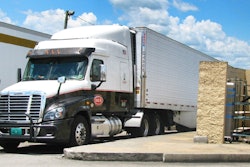Trucking news and briefs for Monday, April 28, 2025:
Insurance costs, in-cab monitoring among research priorities for ATRI
The American Transportation Research Institute’s Board of Directors recently approved the 2025 Top Research Priorities identified by the organization’s Research Advisory Committee (RAC).
ATRI’s RAC selected a diverse set of research priorities designed to address some of the industry’s most critical issues, including rising insurance costs, driver training, improving safety performance and addressing cabotage violations. The 2025 ATRI Top Research Priorities are:
Rising Insurance Costs and Self-Insurance Motivations. Prior ATRI research identified the impact of rising insurance costs on motor carriers, which included carriers reducing coverage levels, raising deductibles and increasing safety technology deployment. This new research will expand that methodology to document current commercial auto insurance trends and investigate the growing role of insurance captives and self-insurance retentions.
[Related: Why insurance premiums keep rising, and what fleets can do about it]
Efficacy of Entry-Level Driver Training on Safety Outcomes. FMCSA’s 2022 Entry-Level Driver Training (ELDT) mandate requires that new entrant truck drivers complete a structured program of theory and behind-the-wheel instruction before taking the CDL skills test. While the ELDT was designed to improve safety outcomes, concerns persist about the effectiveness of training programs in preparing drivers for real-world challenges. Prior ATRI research examined the relationship between driver training curricula and safety outcomes. This new research will build on that work by expanding the use of safety data and statistical models to determine the safety impacts of the mandated ELDT regimen.
Safety Impacts of In-Cab Monitoring. With continued advances in technology focused on in-cab monitoring, more fleets are turning to these systems to better understand driver behaviors in the cab. Prior ATRI research focused on driver perspectives of these systems, specifically driver-facing cameras. This new research will collect confidential in-cab technology data to identify any statistical relationship between in-cab monitoring systems and improvements in safety outcomes. The research will also map specific carrier and driver strategies for managing in-cab data that improve safety outcomes.
[Related: Are driver-facing cameras becoming a necessity?]
Capitalizing on Telematics Data. Telematics technologies have been available to the trucking industry for several decades for asset tracking and driver communications, but today’s telematics deliver expanded functionalities, including vehicle performance and maintenance, and safety and compliance monitoring. However, not all carriers are equipped to fully leverage evolving telematics data to improve operations. This research will create a compendium of data tools and applications for carriers of all sizes to better utilize telematics to improve operational performance.
Understanding the Prevalence and Impact of Cabotage Violations. The U.S.-Mexico-Canada Agreement (USMCA) permits limited cross-border freight transportation between the U.S. and its trading partners in Mexico and Canada, provided that non-U.S. domiciled truck drivers limit their operations to dedicated deliveries of Mexican/Canadian goods to a U.S. shipper. Cabotage violations occur when non-domiciled carriers engage in point-to-point deliveries within the U.S. These cabotage violations can result in unfair competition by undercutting pricing and taking jobs away from U.S.-based trucking companies. This research will seek to quantify the frequency, scale and impact of these cabotage violations.
Wyoming Congresswoman calls on DOT to consider rescinding 2016 English-language guidance
Rep. Harriet Hagemen (R-Wyoming) this month penned a letter to U.S. Department of Transportation Secretary Sean Duffy urging the department to consider rescinding a 2016 guidance document from the Federal Motor Carrier Safety Administration involving English language proficiency testing and enforcement policies for commercial motor vehicle (CMV) and driver inspections.
Hageman pointed to FMCSA regulations that state a qualified driver “[c]an read and speak the English language sufficiently to converse with the general public, to understand highway traffic signs and signals in the English language, to respond to official inquiries, and to make entries on reports and records.”
“Failure to meet this English language proficiency (ELP) requirement constituted ineligibility to drive a CMV, resulting in such drivers being placed out of service,” Hageman said. “As you are well aware, lacking the ability to read and communicate proficiently in English, particularly as it relates to reading and understanding roadway signage, presents a major safety issue for all drivers, which is precisely why these regulations were promulgated in the first place.”
The Obama administration in 2016, however, issued guidance that no longer required FMCSA inspectors to place drivers out of service for ELP violations, adding that “[f]ormal driver interviews to confirm ELP will not be conducted during roadside inspections.” The guidance allowed drivers who cannot read, write or speak English to communicate through interpreters, smartphone apps or other means.
“When looking at available data, it is well within reason to conclude that this guidance has played a factor in the number of trucking accidents throughout the last several years,” Hageman said.
Hageman concluded that the DOT should consider the 2016 guidance as part of President Trump’s deregulatory agenda.
“With the number of accidents involving CMVs on the rise, it is critical that we take steps to uncover and reevaluate these sorts of concealed policies,” she said. “To that end, it is also worth pointing out that President Trump's declaration establishing English as the official national language of the U.S. demonstrates his clear commitment in this area. It is with all these points in mind that I encourage you to include this guidance in the DOT's process of complying with President Trump's” executive order directing agencies to review regulatory actions, including guidance documents, for consistency with the Constitution, U.S. law, and the Administration's priorities.
Fireworks haulers seek renewal of July 4 HOS waiver
The American Pyrotechnics Association has petitioned the Federal Motor Carrier Safety Administration for the renewal of an hours-of-service waiver for drivers transporting fireworks during the Independence Day holiday period.
APA member companies have held waivers or exemptions during Independence Day periods each year since 2005. The most recent waiver expired on July 8, 2024.
The group’s exemption is from the 14-hour rule and the electronic logging device rule, allowing drivers to exclude off-duty and sleeper berth time of any length from the calculation of the 14-hour limit and to use paper records of duty status in lieu of an ELD for the holiday period of June 28 through July 8. APA also requests that two companies that previously did not hold exemptions be included in the request.
APA said that compliance with the 14-hour rule is “extraordinarily challenging” for members of the fireworks industry during the Independence Day period. Most fireworks display shows are transported by pyrotechnicians with hazardous material safety permits in small rented or leased commercial motor vehicles, which do not have sleeper berths. The pyrotechnician drives the display equipment and fireworks to the site, supervises the crew in setting up the display, waits for the display time, fires the display, and returns the equipment and remaining fireworks to a licensed storage facility.
To meet the demand for fireworks without the exemptions, APA noted that its members would need to hire a second driver for most trips, which would substantially increase the cost of the fireworks shows. APA said its members have demonstrated over two decades that the exemption will achieve an equivalent level of safety. APA also reported that its members have agreed to provide additional training to their drivers operating under the exemption on the importance of proper rest periods during the workday.
FMCSA is accepting public comments on the request here through May 19.









